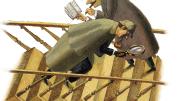Drawing on Sherlock Holmes, Maria Konnikova ’05—the proprietor of Scientific American’s “Literally Psyched” column, now a doctoral student in psychology at Columbia—presents an elementary lesson (and some advanced ones) on enhancing one’s mental prowess. Konnikova clearly recalls details better than Watson did, in this passage from the “prelude” to Mastermind: How to Think Like Sherlock Holmes (Viking, $26.95).
When I was little, my dad used to read us Sherlock Holmes stories before bed. While my brother often took the opportunity to fall promptly asleep on his corner of the couch, the rest of us listened intently. I remember the big leather armchair where my dad sat, holding the book out in front of him with one arm, the dancing flames from the fireplace reflecting in his black-framed glasses. I remember the rise and fall of his voice as the suspense mounted beyond all breaking point, and finally, finally, at long last the awaited solution, when it all made sense and I’d shake my head, just like Dr. Watson, and think, Of course; it’s all so simple now that he says it. I remember the smell of the pipe that my dad himself would smoke every so often, a fruity, earthy mix that made its way into the folds of the leather chair, and the outlines of the night through the curtained French windows. His pipe, of course, was ever-so-slightly curved just like Holmes’s. And I remember that final slam of the book, the thick pages coming together between the crimson covers, when he’d announce, “That’s it for tonight.”…
And then there’s the one thing that wedged its way so deeply into my brain that it remained there, taunting me, for years to come, when the rest of the stories had long since faded into some indeterminate background and the adventures of Holmes and his faithful Boswell were all but forgotten: the steps.
The steps to 221B Baker Street. How many were there? It’s the question Holmes brought before Watson in “A Scandal in Bohemia,” and a question that never once since left my mind. As Holmes and Watson sit in their matching armchairs, the detective instructs the doctor on the difference between seeing and observing. Watson is baffled. And then, all at once everything becomes crystal clear.…
“You see, but you do not observe. The distinction is clear. For example, you have frequently seen the steps which lead up from the hall to this room.”
“Frequently.”
“How often?”
“Well, some hundreds of times.”
“Then how many are there?”
“How many? I don’t know.”
“Quite so! You have not observed. And yet you have seen. That is just my point. Now, I know that there are seventeen steps, because I have both seen and observed.”
…What I couldn’t understand then was that Holmes…had been honing a method of mindful interaction with the world. The Baker Street steps? Just a way of showing off a skill that now came so naturally to him that it didn’t require the least bit of thought. A by-the-way manifestation of a process that was habitually, almost subconsciously, unfolding in his constantly active mind. A trick, if you will, of no real consequence, and yet with the most profound implications if you stopped to consider what made it possible. A trick that inspired me to write an entire book in its honor.









